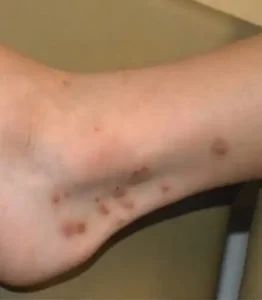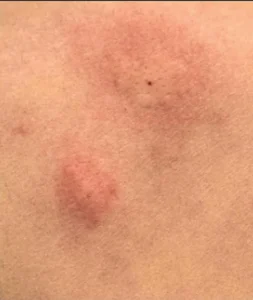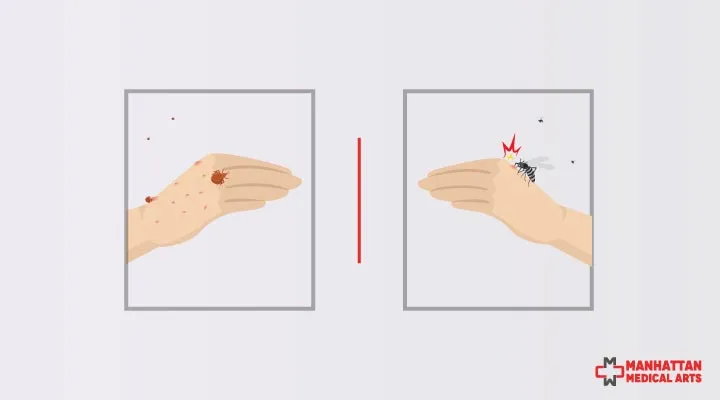If you are scratching a big red welt on your body and wondering which bloodsucking pest caused it, we might be able to give you some answers. The common factor between flea bites and mosquito bites is that both are extremely annoying, irritating, and itchy. And persistently scratching either type of bite can lead to secondary infection in some people. Besides these similarities, there are some differences between flea bites and mosquito bites and in the ways you can treat them, which we will cover in this article.
Mosquitos vs Fleas. What is the difference?
Fleas are a common household pest. They look like small, oval-shaped, and dark insects with hard shells. They are dark reddish-brown in color and have biting mouthparts. Fleas have a small head and six legs with the back legs being the longest among the others. They are normally brought in on pets and can hide under carpets, furniture, and shoes. Besides pets, flea infestations can also be caused by rodents and other wild animals that may exist in your house. Fleas on humans are less common than they are on animals.
As for mosquitoes, they have one pair of scaled wings with a pair of halteres and slender bodies with long legs. The proboscis is made up of mouthparts that allow the mosquito to suck up fluids. The color and size of the mosquito depend on its species and type. Although mosquitoes appear fragile, they are extremely resilient insects and female mosquitoes can easily draw blood from different animals. Mosquitos are capable of surviving in a variety of locations but they are mostly present in hot, humid climates as such conditions are most amenable to mosquito growth and survival.
How to differentiate between flea and mosquito bites?
When you compare flea bites vs mosquito bites, they are both caused by bloodsucking insects, but there are some slight differences in what these bites look and feel like. Flea bites mostly leave an itchy welt on the skin, ankles, and legs. Mosquitoes leave a raised, itchy pink skin bump which can also cause severe allergic reactions in rare cases.
What does a flea bite vs mosquito bite look like?
We wonder what flea bites vs mosquito bites look like, here’s how you can differentiate between them.
Flea Bites

Flea bites usually emerge in groups. They are small red bumps that are extremely itchy and grueling. They are slightly smaller in comparison to mosquito bites. They may appear in groups but each bite may vary in color from pink to dark red. If you are more sensitive to fleas, besides bumps, additional symptoms can also appear. In some cases, the flea bites may start to blister and can even turn into small wounds. Being repeatedly bitten by fleas can worsen your reaction. Flea bites rarely cause severe reactions in most people but can develop into small, raised blisters. Flea bites typically measure only a couple of millimeters long. You can witness flea in the form of black spots or flea poop. The skin around the flea bites can turn red or swell. If you are bitten repeatedly by fleas, it can also cause a chronic condition called papular urticaria. These are hives that can be formed anywhere on the body.
Mosquito Bites

You may have different reactions to mosquito bites, but the most common reaction is an itchy red bump. It can appear within moments or hours after the mosquito has bitten you. A mosquito bite will be itchy for the first few hours of being bitten after which the itchiness will subside and the bump will disappear after a few days. Although, an allergy to mosquito bites can result in a more extreme reaction. You may experience welts, hives, or blisters. Welts caused by mosquito bites can vary in severity and size. Usually, they appear as exaggerated mosquito bites. The skin surrounding the bite will swell and redden. The welts may feel sore to the touch. Severe allergies to mosquito bites are rare, although they do happen. These include hypersensitivity to mosquito bites (HMB) and skeeter syndrome.
Why do mosquito and flea bites itch so much?
Both flea bites and mosquito bites itch so much because, when either of the insects bites you, they pierce the skin to suck the blood up. As they are feeding, they inject their saliva which contains anticoagulants, into the skin. Your body reacts to the saliva of the insect, which results in a small itchy bump.
How to Treat a Flea Bite?
It is imperative that you treat flea bites as soon as you notice it. Treatment helps subside the severity of itching. You also should at all costs avoid scratching flea bites for a number of reasons. Flea bites are open wounds as the flea pierce through the skin to suck the blood out. If you scratch the flea bites, it may lead to a bacterial infection. The first initial step to avoid exasperation of the bite is to wash it with soap and water. Make sure you don’t puncture any blisters caused by flea bites, as that may increase the risk of infection.
It’s common to succumb to a secondary infection, especially in children. Keep your child’s nails short to stop them from scratching. Be mindful of the fact that fleas defecate while they are taking their blood meals. This is why it is essential to thoroughly wash the affected area. To relieve itchy and irritated skin, use antihistamine medication or calamine lotion. If your flea bites remain inflamed, an anesthetic gel may help. Fleas can transmit disease through their bites. They might spread plague, typhus, cat scratch disease, and parasites, such as tapeworms. If you experience a high fever or other concerning symptoms if you have an infected flea, seek medical attention.
How to Treat a Mosquito Bite?
Mosquito bites are not venomous but regardless of that, they are extremely irritating because of the itching and redness. The itchy bites can also cause hives, blisters, and swelling which can further add to the discomfort. If the itchy bites begins to swell, apply a cool washcloth or an ice pack. If it causes a blister, be careful not to burst them. As mosquito bites are penetrating wounds, you must wash them with water and disinfectant soap. Mosquito saliva is the substance that causes the symptoms, not the bite itself. Cleaning the bite will wash away residual traces of saliva. Antihistamines and some topical gels can help combat itching and swelling. If you have an insect bite allergy because of each, you can go into anaphylactic shock after a bite, seek medical attention, and suspect you have been bitten. Mosquitoes can also transmit diseases so if the bite causes other severe symptoms, seek medical attention.
How to get rid of mosquitos and fleas?
Fleas are normally brought into your home via an animal. If you have a pet treat it with a vet-approved flea shampoo or treatment. If there is an infestation at home, thoroughly wash all toys, bedding, and soft furnishings that could have come into contact with the flea infestation. Anything that can’t be washed will need to be thrown away. Use a vacuum cleaner across all surfaces, including the sofa. Don’t forget to empty the vacuum far away from the house so as not to reintroduce the fleas. You may also see missing areas of fur or redness on the animal’s skin. A hunt through your dog’s fur with a flea comb will reveal these tiny critters. You’re most likely to find them on your pet’s neck, belly, lower back, and on the base of the tail.
The best way to control mosquitoes is to try to keep them out of your home in the first place. Avoid having areas of standing or stagnant water close to your homes, such as ponds or water barrels, which can become a mosquito breeding ground. Outside and on window ledges, plant citronella to deter mosquitoes, or inside, use an incense burner with a few drops of citronella or lavender oil as a natural deterrent.
Final Word
Both flea bites and mosquito bites are relatively harmless but if you are allergic to them or are exhibiting some serious symptoms after the bite, consult our primary care physicians so they can help you curb the symptoms and consult you on what to do to avoid getting bitten.
Frequently Asked Questions
How to tell if it's a mosquito bite or flea bite?
Mosquito bites are raised, puffy, and appear quickly. Flea bites are small, red, and often clustered, especially around ankles.
What can be mistaken for flea bites?
Bed bug bites, allergic reactions, and hives can be mistaken for flea bites.
How do I Recognise flea bites?
Flea bites are small, red, and often in clusters on ankles, legs, or waist. They itch intensely.
How do I check my bed for fleas?
Look for tiny black specks (flea dirt or flea poop) on sheets, and inspect seams and crevices for live fleas.
How to Avoid Mosquitoes and Fleas Got a flea infestation?
To avoid mosquitoes and fleas, use repellents, wear long sleeves, and keep your environment clean. For a flea infestation, treat pets, vacuum frequently, wash bedding, and consider professional pest control.
Why do flea bites itch so much?
Flea bites itch because the flea injects saliva into the skin during feeding, which contains anticoagulants and proteins that trigger an allergic reaction, leading to inflammation and intense itching.
How does a flea bite different from other common insect bites?
Flea bites are small, red, clustered, and mainly on ankles. They itch intensely. Mosquito bites are puffy and single, bedbug bites form lines, and other common insect bites are painful with possible blisters. However, Bedbugs bite at night, but they don't bite through clothing.
Can fleas bite people without pets at home?
Yes, fleas can bite people even without pets at home. Fleas can enter from outside, via infested clothing, or from previous occupants, and will bite humans if no animals are available on their exposed skin.
Where can you find flea bites in your body?
Flea bites are commonly found on the ankles, legs, waist, feet, and exposed skin. They may also appear on the arms and armpits if exposed. Bites usually occur in clusters or lines.
– Disclaimer –
This blog is for informational & educational purposes only, and does not intend to substitute any professional medical advice or consultation. For any health related concerns, please consult with your physician, or call 911.
-
About The Author
Dr. Syra Hanif M.D.Board Certified Primary Care Physician
Dr. Syra Hanif is a board-certified Primary Care Physician (PCP) dedicated to providing compassionate, patient-centered healthcare.
Read More







